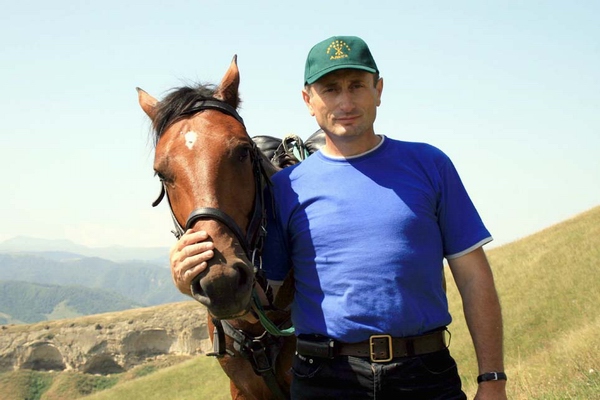
Moscow Sends Delegation to Syria to Consider the Circassians’ Repatriation
Publication: Eurasia Daily Monitor Volume: 9 Issue: 55
By:

On March 16, a Russian parliamentary delegation flew to Syria to examine the plight of Syria’s Circassians and their possible repatriation to the North Caucasus. The delegation included members of the Federation Council, the upper chamber of Russia’s parliament, and regional officials and activists from Adygea, Karachaevo-Cherkessia and Kabardino-Balkaria – 11 people in all. Adam Bogus, the acting head of Adyge Khase, the Circassian activist organization in Adygea, told the Kavkazsky Uzel (Caucasian Knot) website that the delegation would strive to enhance emigration opportunities for Circassians living in Syria. The delegation was expected to spend four days in the country and meet Syrian officials and the Russian ambassador (https://kabardino-balkaria.kavkaz-uzel.ru/articles/203163/, March 16).
The Federation Council’s official website provided a different view of the delegation’s objectives, saying it would attempt to work out peace proposals to resolve the violence in Syria and meet not only with the Circassians, but also other Russian compatriots (https://council.gov.ru/inf_ps/chronicle/2012/03/item19024.html, March 16). In practice, however, since the Russian official delegation includes two ethnic Circassians, Vyacheslav Derev and Albert Kazharov – representing, respectively, Karachaevo-Cherkessia and Kabardino-Balkaria in the Federation Council – it is likely the delegation will focus primarily on the needs of the Circassians.
Previously, Kazharov proposed a range of quick adjustments to existing Russian immigration laws to put the return of Circassians to their historical homeland in the North Caucasus on the fast track. The suggested measures included the opportunity to apply for temporary residence while on a tourist visa, the removal of visa-related fees, and granting refugee status to the Syrian Circassians. The Russian government provides yearly quotas for the regions to grant temporary residence permits for foreign citizens and stateless persons. For 2012, Kabardino-Balkaria was given a quota of 450 slots to grant temporary residence permits, while Karachaevo-Chekessia received 300 and Adygea received 457. According to the director of Russia’s migration services, Konstantin Romodanovsky, quick adjustments of the quotas do not pose a substantial problem (https://gazetayuga.ru/archive/2012/09.htm, March 1).
The Russian parliament upper house’s tentative steps to consider the repatriation of Circassians from Syria to the North Caucasus indicate a political decision has not been made in Moscow to allow the Circassians’ return. At the same time, Moscow has apparently been forced to demonstrate concern in order to appease the Circassians in the North Caucasus and avoid further complications in the region. Moscow’s preferred outcome would be to keep the Syrian Circassians away from the North Caucasus, but under pressure the government is trying to display an understanding of the Circassians’ aspirations.
Instead of openly refusing to accept the Syrian Circassians, the Russian government may be reverting to a campaign of harassing the existing Circassian repatriates in the North Caucasus in order to thwart any potential significant influx of Circassian refugees. In January 2012, several Circassians who had moved from Turkey to Adygea 15-20 years ago were arrested on charges of not having relinquished their Turkish citizenship after they acquired Russian citizenship. Circassian activists who had facilitated the repatriation of Circassians to the North Caucasus in earlier decades were questioned by the Federal Security Service (FSB). A group calling itself the Circassian Patriots discerned in these hostile actions an attempt by the government to discourage would-be Circassian repatriates, principally from war-torn Syria, from returning to the North Caucasus (https://cherkessia.net/bakisacimiz.php?id=3315, March 15).
An estimated 90 percent of the Circassian nation lives outside of its historical homeland in the North Caucasus. Following the Russian Empire’s conquest of the North Caucasus in the 19th century, Circassians were largely killed or starved to death, or driven out of their homeland to the Ottoman Empire. The ethnic cleansing of the Northwestern Caucasus, which Circassians call genocide, was probably part of the strategic calculation of the Russian Empire. Circassians were the largest ethnic group in the North Caucasus, which posed a formidable challenge to Russian dominance over the region. But most importantly, the Circassians resided on the Black Sea coast, which played a central role in Russia’s strategic design of the time. When Russia won the right to host the 2014 Winter Olympic Games in Sochi, Circassian activists worldwide seized on the opportunity to remind the world about their plight. The Circassians are demanding that the Sochi Olympics be moved to another location, insisting that the Olympics cannot be held on the land where the massive killings took place, especially as no reckoning has taken place (for details of the campaign, see https://nosochi2014.com/).
Given the history of the Caucasus conquest, it is not surprising that it is still a matter of hot debate as Moscow tries to play down the hostility that the subjugation of the North Caucasus provoked and instead promotes the idea of the “voluntary accession of the Caucasians into Russia.” In September 2011, the Congress of Circassians organization in Adygea received an official warning for “extremist activities.” The organization referred to “the Russian-Circassian war” in one of its documents, contrary to the officially approved term “Russian-Caucasian war.” The organization is still contesting the official warning (https://kabardino-balkaria.kavkaz-uzel.ru/articles/203095/, March 15).
As the Circassians and Moscow display divergent views on history and contemporary issues, Georgia’s proactive policy toward the North Caucasus is gaining more traction. In March, one of the best known commanders of the Circassian forces that fought Georgia in Abkhazia in the beginning of 1990s, Ibragim Yaganov, visited Georgia. The visit by the “hero of Abkhazia” marked a breakthrough in relations between the Circassians in the North Caucasus and Georgia. Georgian moves to recognize the Circassian genocide and to commemorate various important events in Circassian history have paved the way for rapidly improving relations between the North Caucasian Circassians and Georgians. In a lengthy interview for a Circassian website, Yaganov hailed Georgia’s reforms and sent a strong signal that bilateral relations should be improved between Georgia and Abkhazia, as well as between Georgia and Circassians in the North Caucasus (https://www.hekupsa.com/interviu/ibragim-yaganov-u-nas-est-pravo-izmenit-svoe-otnoshenie-k-gruzii, March 16).
It is quite likely that other public opinion leaders from the Circassian-populated republics of the North Caucasus may follow in the footsteps of Yaganov in order to see with their own eyes the profound changes being made in Georgia. During a visit to the newly opened Circassian Cultural Institute in Tbilisi, Yaganov reportedly referred to Georgia as the “Circassians’ window on Europe” in a sign of the growing importance of Georgian policies toward the North Caucasus. This will only put pressure on the regional governments and on Moscow to adopt long-overdue reforms in the North Caucasus. Cutting across the dividing lines, Georgia will also receive some material and political benefits from increased tourism and greater openness in the Caucasus. Moscow will have to react to these developments. Although war is still a possibility, given the heightened attention to the region from the international community, Moscow will have to provide a more lasting and peaceful solution to counter the fast-paced advances of Georgian policies in the North Caucasus.




